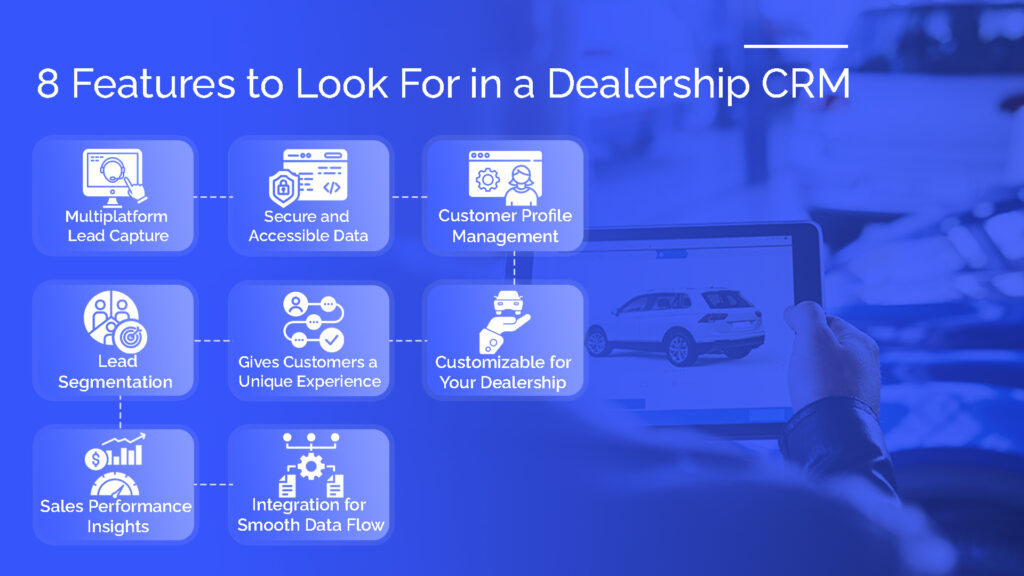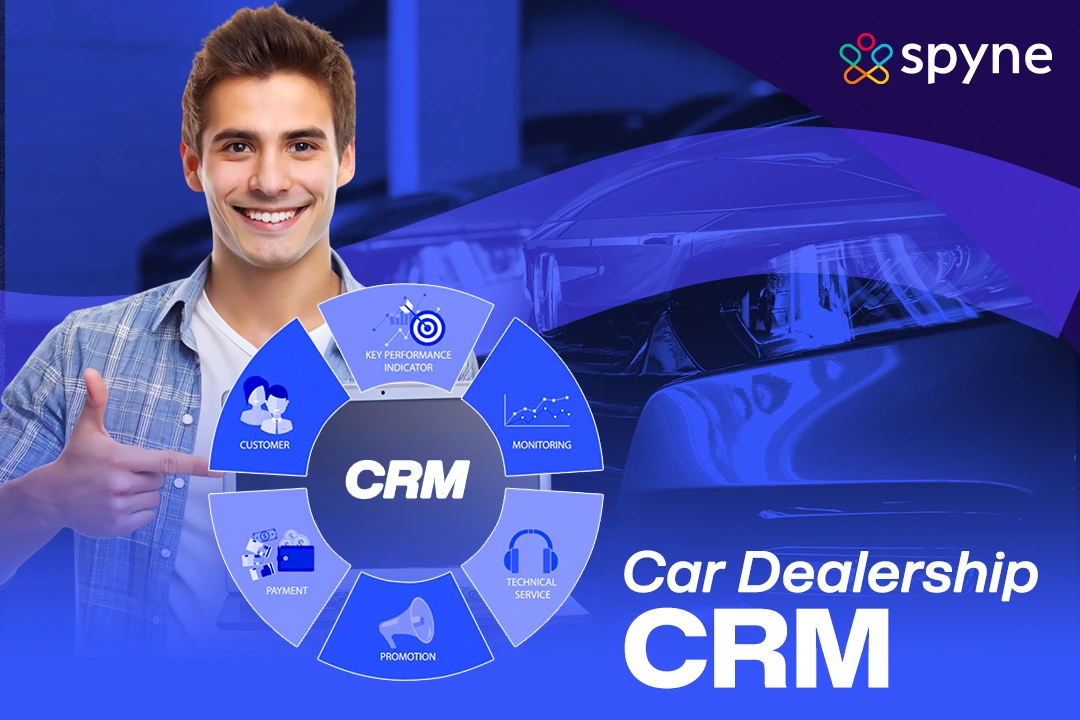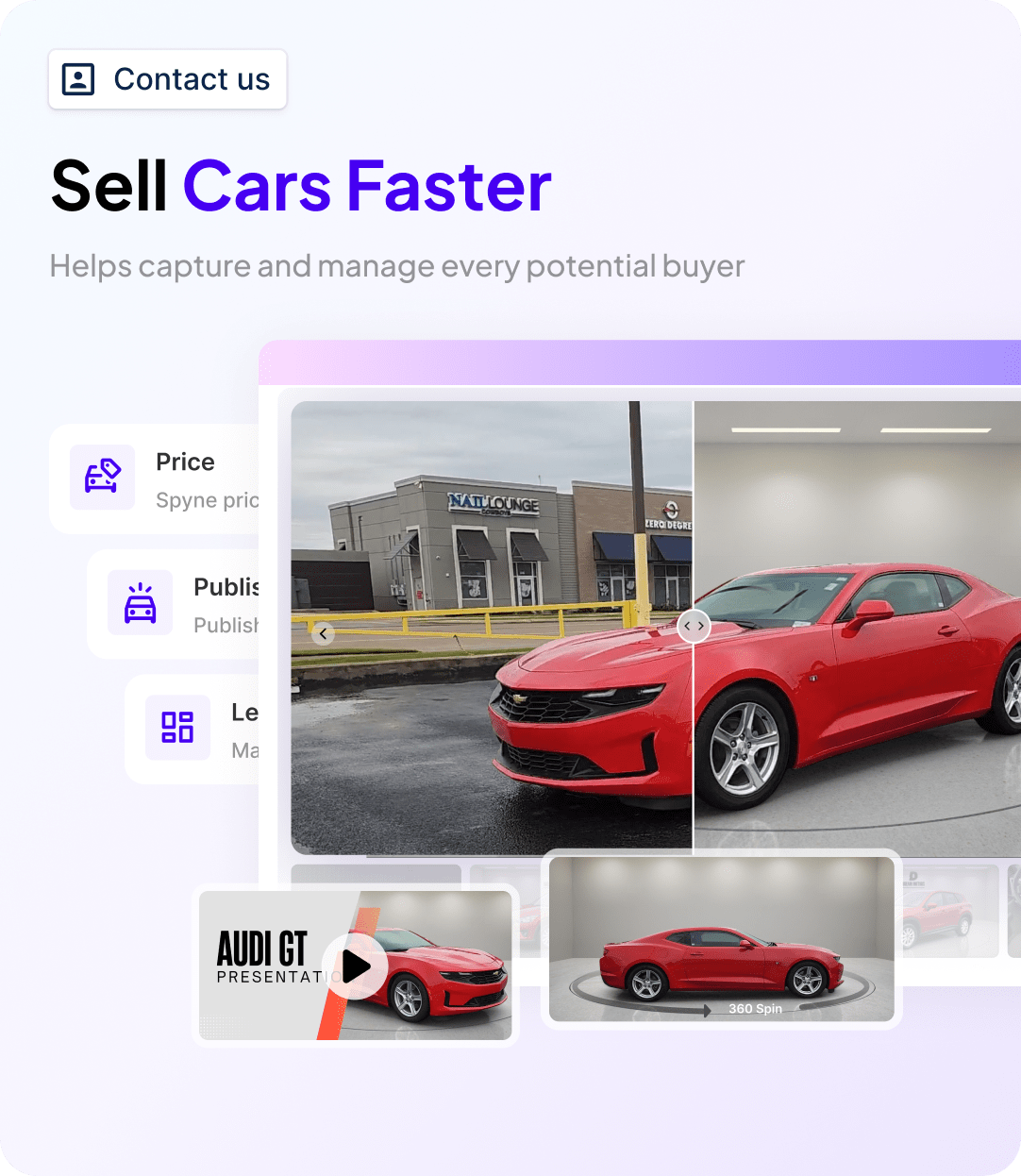Imagine this scenario: You’re juggling 15+ leads via non-stop phone calls, alerts on Facebook Marketplace, and inquiries on your website, and trying to keep track of dealership walk-ins. It’s a ton to manage; by the end of the day, it’s doubly challenging to remember who’s who. Who are your newest leads? Who came in asking to test drive that Ford F-150? It seems chaotic, doesn’t it? Being unable to manage multiple tasks like these can cost you leads and golden opportunities.
In this blog, you’ll see how top dealership CRM’s handle leads with precision, the must-haves in your CRM, and how long-lasting, loyal customer relationships are formed.
What is Dealership CRM?
Dealership CRM is a specialized software automotive companies use to organize leads from various channels, manage customer relationships, track sales processes, and strengthen relationships by providing personalized experiences.
Auto dealership CRM’s primary goal is to capture leads from online marketplaces, lead capture forms, website visits, and showroom walk-ins. These leads are then organized and ranked based on sales opportunity and the likelihood of conversion. This helps used car dealerships focus on high-sales prospects and personalize their marketing strategies.
Customer satisfaction is the ultimate goal of car dealership CRM. So, an automotive CRM is a sure way to boost customer loyalty and increase retention through personalized interactions, around-the-clock engagement, and timely follow-ups.
Top 5 Ways a Dealership CRM Drives Success
An auto dealer CRM is a valuable tool in today’s ever-growing industry. It’s similar to an all-knowing and multitasking assistant that helps you keep track of all your information. What’s better is that all your customers’ essential data is in one place. One of the major plus points is the sheer convenience of a used car dealership CRM. It aims to streamline processes and make overall functioning smooth.
Here are additional ways a dealership CRM drives success:
1. Accessible Lead and Customer Information
One of the standout features of a car dealer CRM system is easy access to lead and customer information. With an automotive CRM like Spyne’s Connect.ai, for example, you have uninterrupted access to customer data like purchase history and service schedules. Additionally, you can track a lead in various sales process stages for better personalization of marketing efforts.
2. Multichannel Lead Interaction
With a reliable CRM, your leads are never lost, and customer queries are never left unanswered. Automotive CRM facilitates integration with text, SMS, email, and social media platforms. This enables seamless customer communication and regular updates on their progress and conversion chances. So you can send personalized follow-ups to your prospects after every interaction to strengthen loyalty.
3. Reporting Analytics
A CRM efficiently analyzes customer data, market trends, sales activity, and marketing campaign effectiveness. This data is used to pinpoint trends, success areas, and faulty elements. The valuable insights a dealership CRM provides allow businesses to optimize their strategies and revamp their efforts with data-supported decisions.
4. Staff Performance Tracking
An automobile CRM truly does it all. It’s interesting to think of it as a helicopter parent, hovering around and monitoring every process to ensure nothing goes wrong. That being said, CRM systems even generate reports on staff performance and assign leads to them based on their skill set. This feature enables better training sessions and allows staff to identify strength areas and sectors needing improvement.
5. Efficient Response Time
There’s no time to waste when you have customer demands to meet and deals to close. It’s safe to say that’s how a CRM system thinks. Through efficient AI automation, CRM ensures your customer interactions are fast and responses are given promptly to advance in the sales process swiftly.
Why Automotive Businesses Need Dealership CRM: 8 Key Benefits
Automotive dealership CRM is a pillar of support and provides the necessary features for improved customer relationships, efficient operations, and enhanced business operations. After extensive research and going through automotive CRM reviews, today’s automotive dealerships realize the innumerable benefits of this reliable system and incorporate it into their daily functions.
Here are the benefits of dealership CRM systems:
1. Seamless Operations Through Smart Automation
With CRM, operations are fast, efficient, and effective. By incorporating AI-powered automation, you can streamline workflows, send bulk follow-ups, combine customer data, manage leads from various channels, and monitor performance metrics.
2. Innovative Communication for Better Sales Potential
When we say innovative communication, we mean seamless integration with all platforms to facilitate nonstop interaction. In addition to strategically sending messages and reminders, CRMs like Spyne’s provide virtual assistants like chatbots and an AI-powered receptionist agent to warrant faster and 24/7 engagement. This way, deals are closed faster, and more sales are achieved.
3. Amplified Marketing Impact with Automated Follow-ups
AI-fueled follow-ups, service reminders, and promotional messages target customer preferences and provide depth to your marketing efforts. Your dealership can appeal to diverse customer groups through personalized communication and expand business growth.
4. Data Centralization for Streamlined Processes
You’re in full control. Combined data under a single dashboard, customer profiles, and sales tracking are easier than ever. Segmented and organized data sets enable more streamlined workflows and reduce the need for duplicate entries.
5. Multidevice-Optimized Functions
A mobile-friendly system enables deal closing and customer communication through any device. You know you’ve reached your full potential when you’re able to seamlessly manage and track the sales process from the convenience of your smartphone. Automatically clean and update customer records, provide online financing options, and track real-time customer data from any device.
6. Improved Customer Loyalty Through Personalized Communication
Dealership CRM systems use customer data to offer exclusive deals and personalized customer reminders. Strong customer relationships are key to unlocking repeat business and referrals, so giving every customer a unique and individualized experience is essential.
7. Unlock New Profit Opportunities
With organized lead management and automated operations, it’s easier for dealerships to expand their horizons and focus on newer opportunities. The process is quite simple: when you’ve got the hang of the basics and become a master at juggling multiple tasks, you can focus on bigger and better revenue streams. So, brainstorm, analyze market trends, and use flexible customer demand to create new sales opportunities.
8. Simplified Inventory Management and Detailed Listings
You can monitor vehicle availability and stock levels live with a dealership CRM. Real-time updates and market analysis automatically update your vehicle listing’s price details and enable you to showcase fresh stock. This way, you won’t fall short on high-demand vehicles and won’t overstock on less popular ones. It’s a simple yet effective way to be the best in the business.
8 Features You Should Look for When Choosing a Dealership CRM
Choosing the right automotive dealership CRM providers requires considerable research, planning, and effort from your side. But don’t worry, it’s all for a good cause. When you prioritize features like multichannel lead capture, lead organization, customer data consolidation, and smart analytics, you’re already halfway up the ladder of success.
So, listed below are aspects to look at to choose the right CRM for your business:
1. Multiplatform Lead Capture
Lead capture from multiple sources, such as websites, social media, and showroom visits, is manageable and enables your sales team to focus on high-priority buyers.
2. Lead Segmentation based on Conversion Likelihood
Most dealerships may struggle to manage their leads, leading to missed opportunities. CRM providers like Spyne help sync leads from various marketplaces to the sales pipeline for efficient segmentation. So, you know where your priorities should lie and the buyers to focus on.
3. Sales Performance Insights
Track the sales pipeline easily, from lead capture to deal finalization. Visibility into the sales funnel lets you identify customer progress, marketing engagement, and hindrances. Data-powered decisions help you make improvements and close deals faster.
4. Secure and Accessible Data
A dealership CRM always looks out for you. This means it’s configured to comply with all data security regulations and secure customer data against breaches.

5. Gives Customers a Unique Experience
Every customer’s car-buying experience should be one to remember. CRM in automobile does just that: analyzing customer data to create an entirely new and personalized experience. So, whether it’s follow-ups, dealership visits, or proactive social media communication, a CRM makes every interaction unique.
6. Integration for Smooth Data Flow
When migrating existing data into a new system, issues like inconsistent information or incomplete uploads may arise. However, systems like Spyne’s independent auto dealer CRM ensure seamless data flow for a hurdle-free transfer. So, connect your dealership’s operations and align all operations on the same page.
7. Customer Profile Management
Customer preferences are dynamic. Naturally, their profiles in your automotive dealer CRM should be, too. Customer profiles are fully customizable and are updated every time they progress in the sales process. It allows for efficient tracking and personalized advertising.
8. Customizable for Your Dealership
Your car dealer CRM system serves you. Hence, automotive dealerships can tweak the system’s functioning to suit their needs. There’s no need for extensive development from scratch. Flexible software like Spyne enables smooth customization for your every automotive need. It’s a scalable solution designed to grow with your business.
11 Best Dealership CRM Software in the Automobile Industry
The best dealership CRM software for the automobile industry offers features that accelerate operations and enable efficient communication. However, these are just a few of the features that make top providers like Spyne, and Podium stand out. So, known for their powerful lead management and customer engagement abilities, here are the best car dealer CRM systems:
1. Spyne
Software Overview: Spyne’s Connect.ai enables dealerships to capture leads faster through AI automation, convert them into sales prospects, and efficiently manage the sales process.
Key Features: Multichannel lead capture, lead syncing into the sales cycle, lead recovery using outbound marketing, 24/7 customer engagement, AI-automated call tracking, and lead progress tracking.
Rating: 4.8
2. Zoho CRM
Software Overview: Zoho CRM strives to convert leads faster and streamline customer relationships through automation.
Key Features: Team performance tracking, AI-written emails, advanced workflows, and real-time customer engagement.
Rating: 4.3
3. Podium
Software Overview: Podium CRM is built for small businesses to manage customer data, reviews, and payments through a single forum.
Key Features: Podium’s AI Scheduler captures every lead and follows up with them via phone and chat—AI-powered marketing using text and customer surveys.
Rating: 4.3
4. VinSolutions
Software Overview: VinSolutions enables dealerships to improve customer interactions through automated processes and performance management.
Key Features: Call tracking, video marketing, customer ID scanning, and a mobile app.
Rating: 4.2
5. DealerSocket
Software Overview: DealerSocket unifies marketing, sales, and service management into one platform to streamline operations and deliver better customer experiences.
Key Features: Automated marketing, dynamic customer dashboards, real-time analytics, and mobile-optimized customer communication.
Rating: 4.0
6. DriveCentric
Software Overview: DriveCentric’s CRM has a user-friendly interface, real-time insights, and automated workflows.
Key Features: Video marketing, inventory management, lead segmentation, and email marketing.
Rating: 4.0
7. AutoRaptor
Software Overview: AutoRaptor’s CRM centralizes customer data, automates sales cycles, and provides performance tracking.
Key Features: Type-to-text feature, MMS integration, click-to-call feature, multi-stage pipeline management, and customized campaigns.
Rating: 4.6
8. ProMax
Software Overview: ProMax is a unified system that oversees lead management and increases dealership sales.
Key Features: Automated follow-ups, DMS integration, AI-powered email campaigns, and inventory tracking.
Rating: 3.9
9. Dominion Dealer Solutions
Software Overview: Provides lead management and tracking, along with DMS.
Key Features: Automated workflows, multichannel marketing, and data analytics.
Rating: 4.0
10. Selly Automotive
Software Overview: An automotive CRM with workflow automation, lead tracking, and a communication suite like text blast marketing.
Key Features: Automated customer responses, consolidation of customer data, and appointment management.
Rating: 4.7
11. Teamgate CRM
Software Overview: Teamgate CRM’s dashboard displays performance metrics and customer data and offers mail integration.
Key Features: A SmartDialer that automatically calls leads, a drag-and-drop feature to move deals in the sales pipeline, and data analytics.
Rating: 4.6
Why Spyne’s Dealership CRM is the Best for Your Automotive Business
Spyne’s dealership CRM is a guidebook for increasing sales and creating lasting customer relationships. We prioritize pleasant customer interactions, lead handling, and building a lasting impression. Our CRM software for auto dealerships is called Connect.ai for a reason; we always keep your business and customers connected.
So, here are our leading features:
1. Lead Capture and Syncing for Better Handling
Through AI-based analysis, Spyne’s automotive CRM can identify high activity on online marketplaces, websites, and social media forums. Every interaction is tracked, from completing an inquiry form to engaging with your recent vehicle addition. Finally, these leads are synced into the sales pipeline for better management and classification based on sales value.
2. Re-engagement of Cold Leads
Outbound marketing is made easy with Spyne’s automotive lead management. Cold leads? There’s no such thing with us. So, previously programmed data and market analysis to identify customer demand is turned into tangible and effective promotional messages. Finally, these alerts are sent out in bulk to ensure you reach a broad range of customers proactively searching for your services.
3. Performance Analytics to Track Progress
You can monitor your dealership’s performance with relevant graphs and insights. We’re here to help you improve and let you know the areas in which you excel. Additionally, you can view the number of leads generated by the day, the progress of those leads, staff efficiency, and track marketing strength. So, there’s always room for improvement with Spyne.
4. AI-powered Virtual Assistants
Missed leads can be frustrating, especially when they’re promising. By choosing Spyne, you won’t have to worry about a lead slipping through the cracks. Our reliable callbot and AI receptionist agent is a virtual assistant, ready to take over when you’re unavailable.
So, turn the toggle when you require its service, and it takes over to handle incoming calls and have conversations regarding inventory, vehicle preferences, and budget with customers. The best part? It keeps customers engaged around the clock, meaning a missed opportunity is next to impossible.
5. Automated Marketing Tools
Whether sending regular and personalized follow-ups to existing customers or pinging your targeted demographic about a new addition in your inventory, Spyne’s AI-powered marketing handles it all. We put your automotive business in the spotlight and help you reach more customers through integration with social media platforms like Facebook for easy communication and promotions. So, your in-house, personalized, and unique marketing campaigns are broadcasted on multiple channels, ensuring complete visibility.
6. Stay Organized with Efficient Operations
Overall, Spyne’s dealership CRM enables dealerships to distribute leads to sales reps, automate workflows, assign jobs to their service department, and monitor how efficiently those tasks are carried out. This increases team profitability and enables them to work together towards accomplishing a common goal of customer satisfaction.
Conclusion
A dealership CRM isn’t just a “helpful addition”; it revolutionizes how your business approaches customer service and puts you on the map. A good automotive CRM oversees the little details and automates the most minor tasks for a smoother process. Unlock new sales opportunities and close deals faster with a reliable lead-handling powerhouse. Ready to take your dealership to new heights? Book a demo with us today!
















